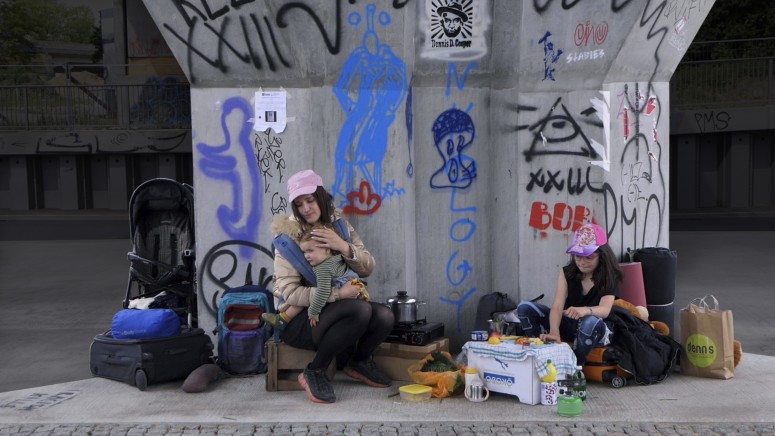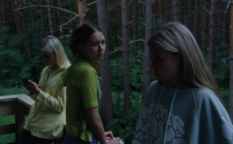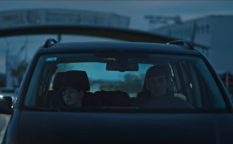Review: Glittering Barbieblood (2021)
Berlinale Shorts Competition

When right after the opening credits a little girl’s voice starts whispering about her new camera by which she films whatever she finds interesting, we don’t expect to see a young homeless family of three under a bridge: a mother (Gina-Lisa Maiwald) holding her baby, and a girl (Mietze Maiwald) preparing food in an improvised open “kitchen”. Surrounded by suitcases, sleeping bags, pram and shopping bags, the clean, washed, manicured, kempt and content family gets ready for their meal. With the traffic above their heads, and the construction work going on right in front of their eyes, their only irritation (although expressed in soft, composed voices) seems to be coming from the garbage carried by the river. Otherwise, all’s just perfectly normal. It’s another day in homeless paradise. Or – are they homeless at all? If not, why are they carrying around all that gear?
In Ulu Braun’s alleged documentary, the viewer is challenged to discover a larger picture through the fantasy world shared by mother and daughter. But, where to start? Maybe with a flier showing a certain Dennis D. Copper – “the saint of the streets”? The identities of many faces that briefly appear on the screen are also unknown. At one point the family will spy upon a group of people in some backyard. “My friends from before are talking about rent prices, racism, female quotas and corruption in the FIFA”, the woman explains. By the look of it, it must some kind of shared community that both of them obviously belonged to once upon a time. Or- did they?
I could end every single paragraph written about this film with a question. Or – two?
We are supposed to “paint-by-numbers” according to Ulu Braun, but how that’s another thing. The path mother and daughter are walking (or flying) is convoluted. There is no way telling what connects those dots, the places and faces. Sometimes, the abstract gets attenuated. A story or two are told, but then it’s back again to the unstable camera movement, the blur and the narrative whose structure is violently shaken and stirred.
People talk, eat peanuts, juggle, they walk dogs or deliver food. Barbie is also present now and then. In a beauty parlor to calm down a crying kid, or on a sticker. She is there in fantasy talks. But there is no glitter, not in the slightest. Not even in the blood.
One of the mysteries of the film gets solved towards the end, and the face of Dennis D. Cooper (“Big Worm”) appears again in Detroit, on his tombstone on thegraveyard next to the former Packard Automotive Plant. But – why did he become the saint of a German town’s streets?
Glittering Barbieblood should a comment on modern urban living, on a big social gap between the privileged and the invisible, but its inaccesible audio-visual language makes it an unlikely international festivals’ choice.
Written/ Directed/ Produced by: Ulu Braun
Camera: Kai Herrmann
Sound: Jochen Jezussek
Visual Assistance: Ella Hebendanz, Milan Braun, Niina Lehtonen Braun
Music by: Fritz Rating
Cast: Gina-Lisa Maiwald, Mietze Maiwald, Dietlind Sommer
Supported by FFA (German Federal Film Board)
















